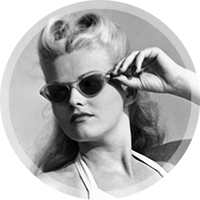

In my mind, one of the most indelible pieces of David Lynch imagery is that of driving down a road in the dark, lit only as far ahead as the headlights can reach, moving quickly, with no clues about where we might end up. This image was the centerpiece of the first Lynch work I properly encountered, Lost Highway, and I noticed it several times in the recent eighteen-part installation of the long-awaited Twin Peaks third season, especially in the last few episodes. Many roads, many dark journeys, many travelers driving to unknown destinations. Unlike Lost Highway’s frenetic, disjointed race, however, what I saw as Twin Peaks: The Return wound down was a quiet acceptance of uncertainty in its road trips. They move at a reasonable pace. There is no music. The drivers and passengers rarely speak, or reconsider. As if everyone knew they didn’t know their fates but knew they had to go meet them anyway.
I was too young to take in Twin Peaks when it originally aired. I have dim memories of a few scattered episodes, which burrowed deep inside of me and only made their strange, shadowy influence known years later—although, some twenty-five years down the road, sometimes I wonder if I ever saw them at all, or if I constructed these memories from my later experience watching the series and connected them to feelings and impressions that had already existed then. Given the nature of Twin Peaks and the context of David Lynch’s body of work, it seems that either explanation is appropriate. I was sixteen when Lost Highway premiered, and a fan of Nine Inch Nails’s Trent Reznor, who produced the film’s carefully engineered soundtrack, and so I was primed to formally enter Lynch’s world. I took in film after film and my transfixion was the epitome of being drawn to certain art I for reasons could not explain or even really comprehend. There were no words for why I liked Lynch, you see. Just flashes of recognition, of memory and those images, burned like sunspots on the lids of my eyes.
I finally circled back to the original Twin Peaks series, which is an interesting coincidence of destination. For most others, it marked their beginning. I came to it older, with several years of experiencing David Lynch’s work, and I came to it at least vaguely aware of the position it occupied in popular culture. And I found that it wove together all those threads, what I brought to it and what it offered and what it had turned into, seamlessly, as if it really had all begun there, and I been there with it all along.
So it was not twenty-five years for me, not entirely twenty-five long years before the third season arrived, but it doesn’t matter how long my own journey to Twin Peaks was precisely, because The Return is, deep in its bones, about nothing so much as the passage of time, and it doesn’t need my own time to reflect it. I realize it’s dangerously reductive to assign any single, simple point to a work like this, but that’s the note that vibrated the loudest and most repeatedly to me: Time, passing, and not always linearly. And the inevitable end that comes after enough time has passed: Death. Although that’s not always the end. But it’s always there.
After I finished watching the last part of Twin Peaks: The Return, a lot of images stayed with me, and there were almost all images that had the subtext of time running underneath them like a river. The town itself, its familiar residents all twenty-five years older. The ones that were still there, in any case. The Log Lady, confined by illness, slowly fading away, telephoning her dispatches to Hawk before she goes completely. FBI agents Cole and Rosenfield facing each other, their quietly tender friendship underscored by actor Miguel Ferrer’s death before the show aired. Cooper, traveled back in time to intercept Laura Palmer, taking her by the hand and leading her gently through the forest and away from her demise. The universe, or some universe, or some slice of our universe yet unexplored, rolling and expanding and contracting and expanding again.
These images are brand new and somehow they too feel like I’ve seen them before. They carry the weight of mythology—a mythology created by the television itself, yes, but connected to something deeper. Something recognizable. Something that we supply ourselves. David Lynch recently said, in response to requests for him to explain the series: “What matters is what you believe happened. Many things in life just happen and we have to come to our own conclusions. You can, for example, read a book that raises a series of questions, and you want to talk to the author, but he died a hundred years ago. That’s why everything is up to you.” It has always been this way. Just because you don’t know where you’re going doesn’t mean you can’t decide why you’re on the road. In fact, there’s little else you can do. The only real answer, perhaps, is to keep going.